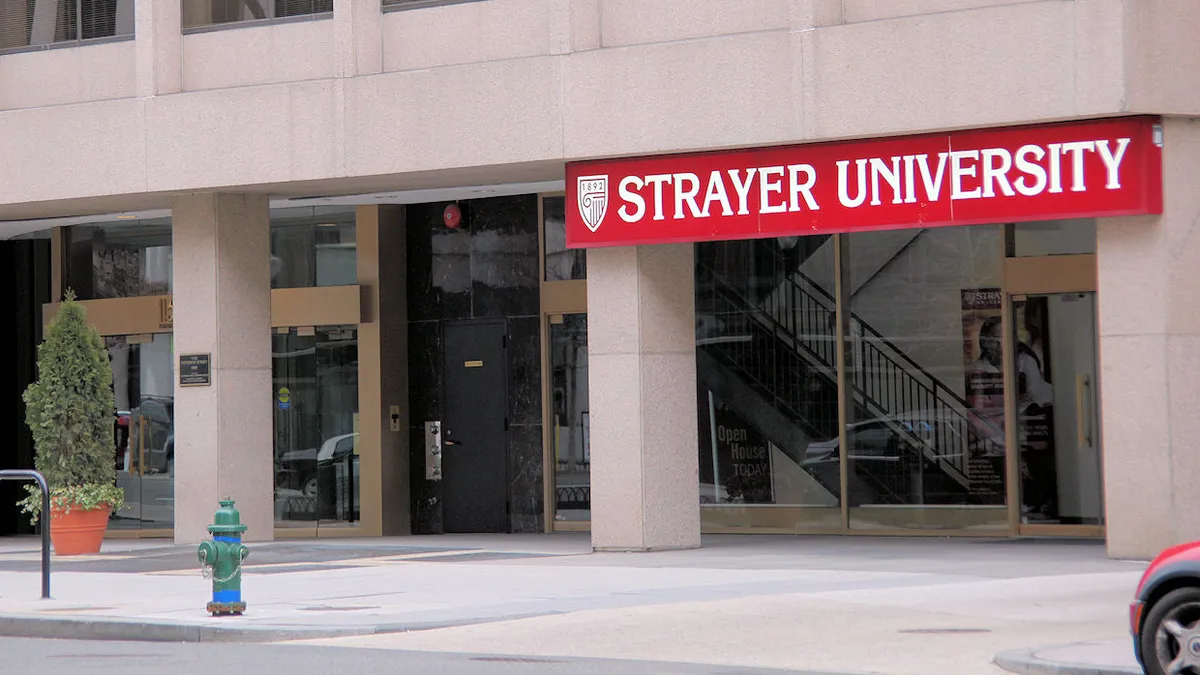Increased scrutiny of the for-profit sector has been a hallmark of the Obama administration's higher education policy. Strayer University is among the few schools in the space that have remained largely above the feds' scrutiny.
Founded in Baltimore in 1892 as a business college aimed at working adults, the school is perhaps the oldest for-profit college in the country. In the 124 years since its founding, Strayer has grown to one of the largest in the space — and while it has faced some similar revenue and enrollment concerns as other for-profits, it has notably avoided many of the same pitfalls. The secret, Strayer executives say, is an ongoing commitment to academic innovation in partnerships and course content.
"Our view is that a really high-quality education program should rise above the regulation. It should transcend all of the scrutiny and really deliver great outcomes," said Strayer@Work CEO Kelly Bozarth. "It’s obviously important to be compliant and to do everything right, but we really focus on a quality program and developing skills that employers need. Our view is that if we do that well, everything else falls in line. If others are not doing that well, it’s a wake-up call for them to innovate the way they teach."
Education Dive recently caught up with Bozarth and Chief Academic Officer and Provost Andrea Backman to find out more about the instution's commitment to innovation.
Filling the skills gaps with corporate-academic partnerships
"Bringing education and business together, we believe, is the fundamental solution to solving the skills gap," said Bozarth. "Businesses are looking for really skilled workers to compete, and education needs to be providing and really in-sync with what business needs."
That mentality is at the core of the company's Strayer@Work program, which offers full degrees, corporate learning programs, and skills bootcamps (bolstered by the recent acquisition of the New York Code + Design Academy). The benefits of these partnerships are two-fold. For Strayer, they offer an enrollment boost. And for the partner, as with Fiat Chrysler and Verizon Wireless, they can help employers attract and retain talent — a detail particularly valuable in high-turnover positions.
Bozarth said there's more to such partnerships than just sitting down with corporations, citing three critical aspects:
- Jointly diagnosing five to eight skills that matter most in driving performance;
- Bringing opportunities to practice and build those skills;
- and measuring the return on that learning investment.
"Our view is that what matters is learning. It may or may not always be a degree, so we offer skill-based programs [and] credentials," said Bozarth, noting Strayer's combination of programs could also put the institution in line with the bootcamps and alternative credentialing programs currently impacting traditional institutions' continuing ed business models.
Creating 'viral-worthy' classroom content
"Online learning is boring," said Backman. "It's just boring. It's rote. It's unsexy. It doesn't make anybody want to come back for more."
It was that line of thought that birthed Strayer Studios, a new initiative that works to identify what "story" a course should tell, building it in an episodic format that keeps students engaged. The company recently hired a documentary filmmaker and producer to lead a team from its DC campus, tasked with translating online content in a way that is "provocative and interesting for students."
As with its corporate alliances, partnering with creatives who aren't part of traditional academia is key to achieving this, said Backman.
"We are taking all of the learnings from what Strayer@Work is doing and literally fundamentally changing the university's core competencies to then meet what employers need," said Backman. "We're not just taking them and shoving them in courses. We're thinking very deeply about who we are as a university and how the core competencies drive everything we do."
Would you like to see more education news like this in your inbox on a daily basis? Subscribe to our Education Dive email newsletter! You may also want to read Education Dive's look at how institutions are handling the workplace climate consequences of campus carry.













